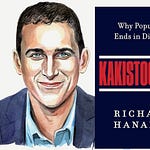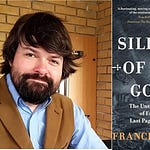If you have a sibling with autism, your future child’s risk for an autism diagnosis is increased by a factor of 2 to 3.5×. Orchid’s whole genome embryo reports can help mitigate your child’s risk by screening for over 200 genetic variants definitively linked to autism and other neurodevelopmental disorders. Discuss your situation with a genetics expert.
On this episode of Unsuperivsed Learning Razib talks to native Californian, Inez Stepman. Stepman has an undergraduate degree in philosophy from UC San Diego, and obtained her J.D. from University of Virginia. She is a Senior Policy Analyst at the Independent Women’s Forum, a Lincoln Fellow at the Claremont Institute and a contributor to The Federalist. Stepman is also a co-host of the High Noon podcast.
Razib and Stepman first talk about her reaction to Marxist author Malcom Harris’ Palo Alto: A History of California, Capitalism and the World, exemplified by her piece in First Things, Ambitious Nihilism. A native of Palto Alto who went to high school with Harris in the early 21st century, Stepman believes that the left-wing narrative in Palo Alto is misleading. Though Silicon Valley avows fashionable social liberalism and radicalism, Harris argues that it is actually a seedbed for right-wing neo-Neo-Reaganism and capitalism. Stepman disagrees; though it is true that from a Marxist and explicitly socialist perspective Silicon Valley falls short, the overall political tenor was firmly on the left. She recalls even after 9/11 that her Palo Alto milieu took a dim view of American patriotism. For Stepman, Silicon Valley was more a laboratory of fashionable woke shibboleths, about a decade ahead of its time, as well as being the training ground for conformist grinds who were geared toward jumping over the next academic or professional hurdle.
Stepman sees this narrow and short-sighted ethos throughout Silicon Valley, and the broader sense in American culture that technology will allow us to transcend our limits to humanity. She argues that wealthy tech entrepreneurs who aim to defeat death, like Bryan Johnson, are fundamentally inhuman in their goals and orientation. Razib and Stepman discuss extensively advances in biotechnology and fertility in particular that American society seems to take for granted, like noninvasive prenatal testing and gene editing, which are rolling out without much discussion.












